人教版2017高中(必修三)英语Unit1Festivals_around_the_world_Exerciseppt课件
人教版高中英语必修三unit1-Festivals-around-the-world-Using-l

tenth lunar month. F 3. Hu Jin had been waiting for Li Fang for
a long time with a gift for him. T
第六页,共30页。
Read again and answer the questions.
1. Why was the TV story what Li Fang needed? The TV story was a sad story about lost love--
heart-broken
not turn up not keep her word
Story-retelling
Fool?
Be laughed
at?
第十页,共30页。
Throw away his roses and chocolates
At last…
tea shop
Why are you so late?
表达
make / offer an apology
(biǎodá)道 accept an apology 歉
refuse an apology 接受道歉
拒绝道歉
第二十页,共30页。
5.He would drown his sadness in coffee.
drown 1) 淹没(yānmò)
The flood drowned the streets and houses. 2) 淹死
第七页,共30页。
3. What is the reason why Li Fang and Hu Jin did not meet on time?
Because Li Fang waited in the coffee shop and Hu Jin waited in the tea shop. 4. Why was Li Fang so worried at the end of the story?
人教高中英语 必修3 unit1 Festivals around the world

各种各样的 相同种类的 不同种类的 这(那)种 某种
① 我们卖各式各样的鞋。 We sell all kinds of shoes.
= We sell shoes of all kinds. ②那类问题是很难解答的。
That kind of questions is very difficult to answer. = Questions of that kind are difficult to answer.
I mean the room for my bedroom. had meant to 本来打算做 I had meant to do English exercises first.
---You should have thanked her before you left.
---I meant __B___, but when I was leaving I couldn’t find her anywhere.
take place与happen take place:发生,举行;侧重安排或计划 而发生的事,带有“非偶然”的意思。
The Olympic Games take place every four years. happen:常指客观事物或情况偶然、不 可预料地发生。(happen to … 碰巧发生)
A. to do B. to C. doing D. doing so
想一想
2.take place发生,举行
<不及物动词,不用于被动语态> Our school sports meeting will take place next
week. Great changeds have takent. (1) 庆祝;祝贺
Unit 1 Festivals around the World 教学设计(英语人教版高中必修3)

Unit 1 Festivals around the WorldThe reading passage entitled FESTIV ALS AND CELEBRATIONS briefly describes the origins of different festivals, and then introduces four kinds that are celebrated in most parts of the world. It is important for students to appreciate the values of festivals and learn to attach importance to their culture. Through comparison and contrast, students will be able to evaluate their own culture aswell as exotic culture, keep uptheir own advantages and learn from others, thus cultivating an international outlook.1. Knowledge Objectives:(1)Students know the origins of different festivals.(2)Students learn about history and basic knowledge of festivals both at home and abroad.2. Skill Objectives:(1) Students can practice their reading ability and learn different reading skills.(2) Students can express ideas about festivals and how people celebrate these different festivals.3. Emotional Attitude and Values:(1) Students can get familiar with the origins of festivals both at home and abroad.(2) Students can develop love for their own national culture and customs.(3) Students also can develop the sense of gratitude.4. Learning Strategies:Students can use reading skills to collect and analyze the significant information in the text. They can also work with their partners or work in groups to practice.5. Cross-culture Awareness:Students will cultivate an international outlook through comparison and contrast.Teaching Important Points:1. Students learn more about history and basic knowledge of festivals.2. Students learn different reading skills.Teaching Difficult Points:1. Students enhance their reading ability.2. Students can talk about festivals and celebrations.3. Students will fully understand and keep up the values of festivals.Teaching MethodsElicitation, discussion, listening, group workTeaching AidsA computer, a blackboardStep1 Warming upPlay a guessing game. Try to guess what festival it is.Step2 Fast Reading1.Choose the right main idea for each part.Part1. (Para.1) ___________Part2. (Para.2-5) ___________Part3. (Para.6) ___________A. Different kinds of festivals around the worldB. The reasons why people celebrate the festivalsC. The origins of the festivals2. Fill in the blanksTo day’s festivals have many________:some ________,some ________,some ____________________________.Match the origins with the examples.Step3 Careful Reading1. Festivals of the DeadComplete the table.2. Festivals to Honor PeopleWho are mentioned in this part?3. Harvest Festivals & Spring FestivalsDo a True or False.Only China has mid-autumn festival.Spring festivals are the ones that look forward to the end of winter and to the coming of spring. There are dragon boat race and carnivals at the Spring Festivals in China.4. The Last ParagraphWhy do people celebrate festivals?Step4 ConsolidationThere are all kinds of festivals and ___________ (celebrate) around the world. Some festivals are held to ________ the dead or satisfy the _________(ancestor) in case they might return either to help or to do _______, while other festivals are _______ ( hold ) to honor famous people. Harvest and Thanksgiving festivals are happy events because the food is _________ (gather) for the winter and the __________ (agriculture) work is over. And the most __________ (energy) and important festivals are the ones that look ________ to the end of winter and to the ________ (come) of spring.Step5Language points1.Festivals are meant to celebrate important times of year. mean: 1) 打算,意欲mean+ n/ pron/ to soHe means what he says.He means to cause trouble.2) be meant for“打算给予;打算作……用”。
人教版高中英语(必修3)unit1festivalsaroundtheworld
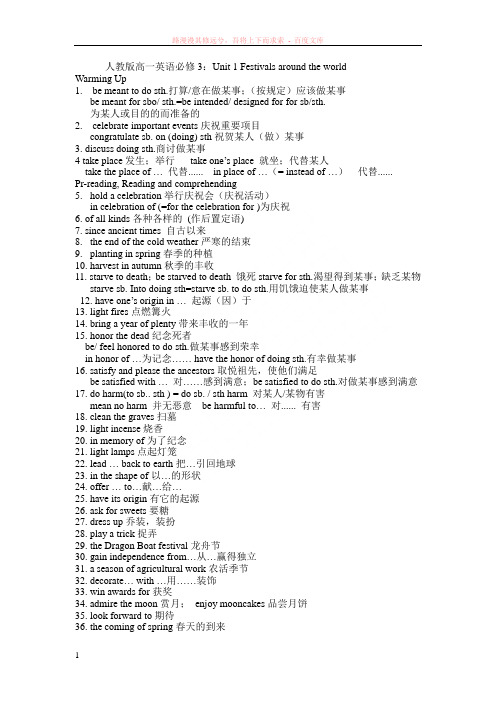
人教版高一英语必修3:Unit 1 Festivals around the worldWarming Up1.be meant to do sth.打算/意在做某事;(按规定)应该做某事be meant for sbo/ sth.=be intended/ designed for for sb/sth.为某人或目的的而准备的2.celebrate important events庆祝重要项目congratulate sb. on (doing) sth祝贺某人(做)某事3. discuss doing sth.商讨做某事4 take place发生;举行take on e’s place 就坐;代替某人take the place of …代替...... in place of …(= instead of …)代替......Pr-reading, Reading and comprehending5.hold a celebration举行庆祝会(庆祝活动)in celebration of (=for the celebration for )为庆祝6. of all kinds各种各样的(作后置定语)7. since ancient times 自古以来8.the end of the cold weather严寒的结束9.planting in spring春季的种植10.harvest in autumn秋季的丰收11. starve to death;be starved to death 饿死starve for sth.渴望得到某事;缺乏某物starve sb. Into doing sth=starve sb. to do sth.用饥饿迫使某人做某事12. have one’s origin in …起源(因)于13. light fires点燃篝火14. bring a year of plenty带来丰收的一年15. honor the dead纪念死者be/ feel honored to do sth.做某事感到荣幸in honor of …为记念…… have the honor of doing sth.有幸做某事16. satisfy and please the ancestors取悦祖先,使他们满足be satisfied with …对……感到满意;be satisfied to do sth.对做某事感到满意17. do harm(to sb.. sth ) = do sb. / sth harm 对某人/某物有害mean no harm 并无恶意be harmful to…对...... 有害18. clean the graves扫墓19. light incense烧香20. in memory of为了纪念21. light lamps点起灯笼22. lead … back to earth把…引回地球23. in the shape of以…的形状24. offer … to…献…给…25. have its origin有它的起源26. ask for sweets要糖27. dress up乔装,装扮28. play a trick捉弄29. the Dragon Boat festival龙舟节30. gain independence from…从…赢得独立31. a season of agricultural work农活季节32. decorate… with …用……装饰33. win awards for获奖34. admire the moon赏月;enjoy mooncakes品尝月饼35. look forward to期待36. the coming of spring春天的到来37.give children lucky money in red paper用红包装着压岁钱给小孩38. dragon dances舞龙灯39. the lunar New Year阴历新年40.day and night整天;日夜41.colorful clothing of all kinds各种艳丽的衣服42. Christian countries信奉基督教的国家43. be covered with被…罩着44. as though好像45.love to get together to eat, drink and have fun with each other喜欢聚在一起吃、喝、玩耍have fun with sb. =enjoy oneself / have a good time with sb.与某人一起玩得愉快46.enjoy life享受生活47. forget our daily work for a little while暂时忘记日常生活中的烦恼Learning about language and using langbuage48. have a good time with和…一起开心49. at the parking lot在停车场50. be heart-broken心都碎了51. at the coffee shop在咖啡馆里;after work下班后52. turn up出现53. right now立刻54. keep one’s word守信用55. hold one’s breath屏气56. drown one’s sadness in coffee用咖啡来解愁57. wipe the table擦好桌子58. visit the earth下凡来到人间;(be) on earth在人间59. the herd boy牛郎60. set off for home动身回家61. remind sb. of …因…想起某人62.pass the tea shop on the corner路过在转角处的茶馆63. wave at sb. 向某人招手Workbook64. wipe all one’s tears拭去泪水;hide the sadness on one’s face掩盖住脸上的悲伤65. dream about going back to one’s homeland 日夜梦想回到祖国66. win the beat actor at the Golden Rooster Award 荣获金鸡奖的最佳男演员67.be ready for a second try准备第二次尝试68.leave sb. alone让某人一个人呆会69. full-time workers全职工70.have free time有时间71 ask for permission请求许可72.have an eye examination参加一个视力检测73.sit in a café坐在咖啡厅里74.32 degrees below freezing零下32度75. pile… up along the sidewalks沿着人行道把…堆起来76. ride in horse carriage乘座马车77.admire the ice sculptures欣赏冰雕78. be dressed in heavy clothes穿了厚厚的衣服。
人教版高中英语(必修3)unit1festivalsaroundtheworld
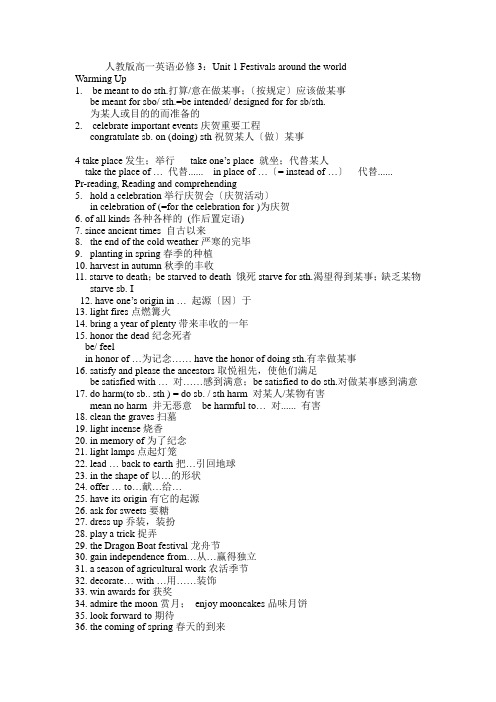
人教版高一英语必修3:Unit 1 Festivals around the worldWarming Up1.be meant to do sth.打算/意在做某事;〔按规定〕应该做某事be meant for sbo/ sth.=be intended/ designed for for sb/sth.为某人或目的的而准备的2.celebrate important events庆贺重要工程congratulate sb. on (doing) sth祝贺某人〔做〕某事4 take place发生;举行take on e’s place 就坐;代替某人take the place of …代替...... in place of …〔= instead of …〕代替......Pr-reading, Reading and comprehending5.hold a celebration举行庆贺会〔庆贺活动〕in celebration of (=for the celebration for )为庆贺6. of all kinds各种各样的(作后置定语)7. since ancient times 自古以来8.the end of the cold weather严寒的完毕9.planting in spring春季的种植10.harvest in autumn秋季的丰收11. starve to death;be starved to death 饿死starve for sth.渴望得到某事;缺乏某物starve sb. I12. have one’s origin in …起源〔因〕于13. light fires点燃篝火14. bring a year of plenty带来丰收的一年15. honor the dead纪念死者be/ feelin honor of …为记念…… have the honor of doing sth.有幸做某事16. satisfy and please the ancestors取悦祖先,使他们满足be satisfied with …对……感到满意;be satisfied to do sth.对做某事感到满意17. do harm(to sb.. sth ) = do sb. / sth harm 对某人/某物有害mean no harm 并无恶意be harmful to…对...... 有害18. clean the graves扫墓19. light incense烧香20. in memory of为了纪念21. light lamps点起灯笼22. lead … back to earth把…引回地球23. in the shape of以…的形状24. offer … to…献…给…25. have its origin有它的起源26. ask for sweets要糖27. dress up乔装,装扮28. play a trick捉弄29. the Dragon Boat festival龙舟节30. gain independence from…从…赢得独立31. a season of agricultural work农活季节32. decorate… with …用……装饰33. win awards for获奖34. admire the moon赏月;enjoy mooncakes品味月饼35. look forward to期待36. the coming of spring春天的到来37.give children lucky money in red paper用红包装着压岁钱给小孩38. dragon dances舞龙灯39. the lunar New Year阴历新年40.day and night整天;日夜41.colorful clothing of all kinds各种艳丽的衣服42. Christian countries信奉基督教的国家43. be covered with被…罩着44. as though好似45.love to get together to eat, drink and have fun with each other喜欢聚在一起吃、喝、玩耍46.enjoy life享受生活47. forget our daily work for a little while暂时忘记日常生活中的烦恼Learning about language and using langbuage48. have a good time with和…一起开心49. at the parking lot在停车场50. be heart-broken心都碎了51. at the coffee shop在咖啡馆里;after work下班后52. turn up出现53. right now立即54. keep one’s word守信誉55. hold one’s breath屏气56. drown one’s sadness in coffee用咖啡来解愁57. wipe the table擦好桌子58. visit the earth下凡来到人间;(be) on earth在人间59. the herd boy牛郎60. set off for home动身回家61. remind sb. of …因…想起某人62.pass the tea shop on the corner路过在转角处的茶馆63. wave at sb. 向某人招手Workbook64. wipe all one’s tears拭去泪水;hide the sadness on one’s face掩盖住脸上的悲伤65. dream about going back to one’s homeland 日夜梦想回到祖国66. win the beat actor at the Golden Rooster Award 荣获金鸡奖的最正确男演员67.be ready for a second try准备第二次尝试68.leave sb. alone让某人一个人呆会69. full-time workers全职工70.have free time有时间71 ask for permission恳求答应72.have an eye examination参加一个视力检测73.sit in a café坐在咖啡厅里74.32 degrees below freezing零下32度75. pile… up along the sidewalks沿着人行道把…堆起来76. ride in horse carriage乘座马车77.admire the ice sculptures欣赏冰雕78. be dressed in heavy clothes穿了厚厚的衣服。
人教版高一英语必修三Unit1Festivals around the world教案设计
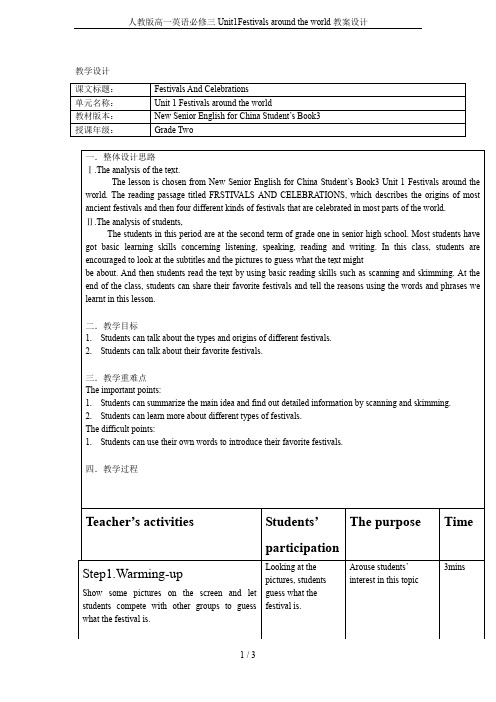
二.教学目标 1. Students can talk about the types and origins of different festivals. 2. Students can talk about their favorite festivals.
三.教学重难点 The important points: 1. Students can summarize the main idea and find out detailed information by scanning and skimming. 2. Students can learn more about different types of festivals. The difficult points: 1. Students can use their own words to introduce their favorite festivals.
人教版高一英语必修三 Unit1Festivals around the world 教案设计
教学设计
课文标题: 单元名称: 教材版本: 授课年级:
Festivals And Celebrations Unit 1 Festivals around the world New Senior English for China Student’s Book3 Grade Two
Step2.Reading
. Ask the students to find out the subtitles, fill in
the blanks and analysis the text.
Students can find
out the subtitles
人教版高中英语 必修三 Unit1《Festivals around the world ---W

Answer the following questions
• 1.what festival is mentioned in the video? Christmas Day
• 2 when does the festival celebrate?
It celebrates on December, 25th.
National Festival on October 2
Country: India
Dragon-boat Festival
Country: China
Columbus Day
Country USA
Harvest Festivals
Para4
Choose the best answer.
Many activities can be held in harvest festivals EXCEPT
Food in the shape of skulls, and cakes with “bones” on
them
Tomb -Sweeping Day
Clean graves; Light incense Burn paper money; Offer wine , food, fruit and flowers to the dead
the famous writer (为了纪念这位著名的作家).
5.My students have worked hard, and I
_a_m__p_r_o_u_d__o_f _ them. 6.Go with your friends and ___h_a_v_e_f_u_n_w__ith
them.
• 3.Who is the happiest at the festival? Children
人教版英语必修三-Unit-1-Festivals-around-the-world-教案设计_

人教版英语必修三-Unit-1-Festivals-around-th e-world-教案设计Unit 1 Festivals around the world I.单元教学目标II.目标语言1.5 Learning about Language 分词汇和语法两部分。
其中Discovering useful words and expressions是本单元单词的英文释义练习和用文章中的词汇的适当形式填空;Discovering useful structures 是以文章内容为载体在语境中练习语法,掌握情态动词。
由此可以看出本教材已明显地由结构为特征的传统语法训练转变到以交际功能为特征的功能语法训练,充分体现了新教材话题、功能、结构相结合的特点。
1.6 Using Language 是英语听说读写的全面运用的练习。
1.6 ①Listening 是课文的延伸,通过听几位学生参加Trinidad Carnival 节日游行的两段对话,使学生体会参加节日游行的真实情景,既训练听力一通过问题训练了他们的分析能力。
1.6 ②Speaking 分为两部分。
第一部分通过电话突出交际用语功能的训练;第一部分让学生编对话,可以按自己的想象、经历为内容,训练思维和表达能力。
1.6 ③Reading 是发生在情人节的一个令人伤心的爱情故事,其中又插入了一个“七巧节”的故事。
阅读后的讨论不仅帮助学生理解文章主旨大意,更重要的是让学生学会寻求解决问题的方法。
1.6 ④ Writing 的任务是写一个与文章结尾不同的结局。
旨在让学生通过思考写出自己的想法,尝试自己解决问题。
总之,通过本单元的系统学习,让学生了解世界各国的节日及民俗,学习有关节日的词汇,并能够丰富语言知识,提升用英语表达观点的能力。
2. 教材重组2.1 口语从话题内容和功能上分析Warming Up 与Workbook中的Listening和Talking相一致,旨在启发学生讨论、思考并引出本单元关于节日的话题,可以整和成一节任务型“口语课”。
人教版英语必修3 Unit1 Festivals around the world

Unit1 Festivals around the worldTeaching aims:1. TopicFestivals; how festivals begin; how to celebrate festivals2. Useful words and expressions:Starve plenty satisfy ancestor lamp lead feast bone origin trick poet arrival national gain independence gather agricultural European custom award watermelon handsome rooster admire energetic forward Easter clothing religious social Christian daily permission possibility fool apologise drown sadness obvious wipe lovely couple weep announcer forgiveTake place in memory of dress up play a trick look forward to day and night as though have fun with turn up keep one’s word hold one’s breath 3. Functional items:1)RequestCould /Would you please…?Could I have…?Could we look at…?I look forward to ….May I see…?2)ThanksIt’s very kind of you…Thank you very much/thanks a lot.I’d love to.It was a pleasure….Don’t mention it.You are most welcome.4. Structures情态动词can, could, may, might, will, would, shall, should, must, can’t 等的用法。
人教版高中英语必修三Unit1Festivalsaroundtheworld课文知识点解析
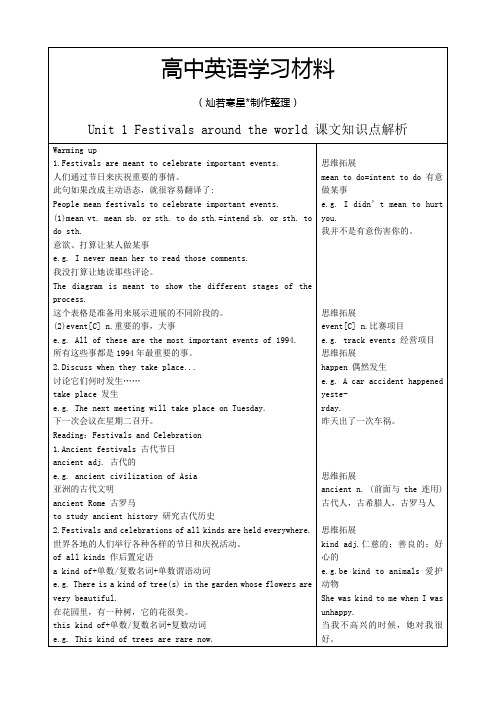
happy memories of his stay in London
对在伦敦幸福的记忆
8.lead the ancestors back to earth
把祖先带回到地球
lead sb. to...把某人带到……
e.g. He led us to his home.
plenty n./pron. 足够;大量
e.g. years of peace and plenty 太平丰收年
There is plenty of room in my bag.
我包里还很空。
6.Some festivals are held to honor the dead,or satisfy and please the ancestors,who could return either to help or do harm.
一些人可能因为他们的动物,花,果实和蔬菜而赢得奖品。
award[C] n. 评价 报酬 奖品
e.g.He has won the best actor award.
他已经获得了最佳男演员奖。
19.In China and Japan there are mid-autumn festivals,when people admire the moon and give gifts of mooncakes.
People mean festivals to celebrate important events.
(1)mean vt. mean sb. or sth. to do sth.=intend sb. or sth. to do sth.
人教版高中英语必修3人教版必修三Unit1Festivals around the world教案Period 1 Warming up and Reading
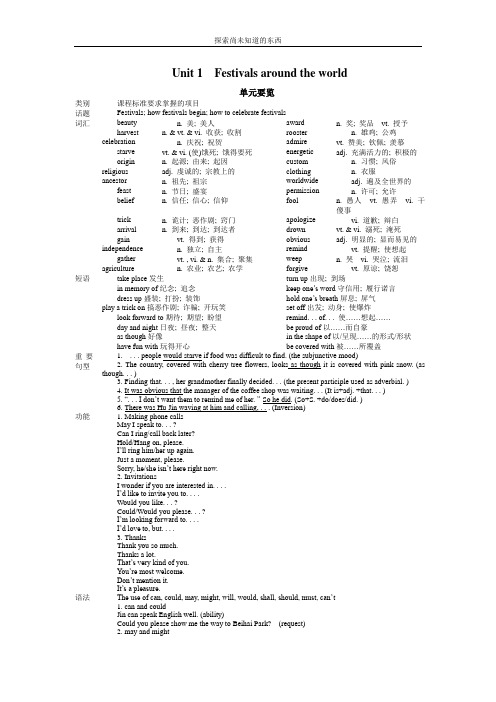
Unit 1Festivals around the world单元要览类别课程标准要求掌握的项目话题Festivals; how festivals begin; how to celebrate festivals词汇beauty n. 美; 美人award n. 奖; 奖品vt. 授予harvest n. & vt. & vi. 收获; 收割rooster n. 雄鸡; 公鸡celebration n. 庆祝; 祝贺admire vt. 赞美; 钦佩; 羡慕starve vt. & vi. (使)饿死; 饿得要死energetic adj. 充满活力的; 积极的origin n. 起源; 由来; 起因custom n. 习惯; 风俗religious adj. 虔诚的; 宗教上的clothing n. 衣服ancestor n. 祖先; 祖宗worldwide adj. 遍及全世界的feast n. 节日; 盛宴permission n. 许可; 允许belief n. 信任; 信心; 信仰fool n. 愚人vt. 愚弄vi. 干傻事trick n. 诡计; 恶作剧; 窍门apologize vi. 道歉; 辩白arrival n. 到来; 到达; 到达者drown vt. & vi. 溺死; 淹死gain vt. 得到; 获得obvious adj. 明显的; 显而易见的independence n. 独立; 自主remind vt. 提醒; 使想起gather vt. , vi. & n. 集合; 聚集weep n. 哭vi. 哭泣; 流泪agriculture n. 农业; 农艺; 农学forgive vt. 原谅; 饶恕短语take place发生turn up出现; 到场in memory of纪念; 追念keep one’s word守信用; 履行诺言dress up盛装; 打扮; 装饰hold one’s breath屏息; 屏气play a trick on搞恶作剧; 诈骗; 开玩笑set off出发; 动身; 使爆炸look forward to期待; 期望; 盼望remind. . . of. . . 使……想起……day and night日夜; 昼夜; 整天be proud of以……而自豪as though好像in the shape of以/呈现……的形式/形状have fun with玩得开心be covered with被……所覆盖重要句型1. . . . people would starve if food was difficult to find. (the subjunctive mood)2. The country, covered with cherry tree flowers, looks as though it is covered with pink snow. (as though. . . )3. Finding that. . . , her grandmother finally decided. . . (the present participle used as adverbial. )4. It was obvious that the manager of the coffee shop was waiting. . . (It is+adj. +that. . . )5. “. . . I don’t want them to remind me of her. ” So he did. (So+S. +do/does/did. )6. There was Hu Jin waving at him and calling, . . . (Inversion)功能 1. Making phone callsMay I speak to. . . ?Can I ring/call back later?Hold/Hang on, please.I’ll ring him/her up again.Just a moment, please.Sorry, he/she isn’t here right now.2. InvitationsI wonder if you are interested in. . . .I’d like to invite you to. . . .Would you like. . . ?Could/Would you please. . . ?I’m looking forward to. . . .I’d love to, but. . . .3. ThanksThank you so much.Thanks a lot.That’s very kind of you.You’re most welcome.Don’t mention it.It’s a pleasure.语法The use of can, could, may, might, will, would, shall, should, must, can’t1. can and couldJin can speak English well. (ability)Could you please show me the way to Beihai Park? (request)2. may and mightMay we see the awards for the teams? (permission; request)She might give you some new clothing. (possibility)3. will and wouldThe Spring Festival is the most fun. The whole family will come for dinner. (promise; agreement) Often he would dress up like a rich man. (past habit; custom)4. shall and shouldThe harvest festival begins on Sunday. We shall be there with our friends. (promise; agreement) You should arrive at the airport two hours before he goes. (advice)5. must and can’tWang Feng wins an award every year. He must be very strong. (speculation)You must be joking. That can’t be true. (guessing)教学重点1. Get students to know about festivals around the world.2. Have students learn some useful new words and expressions about festivals and customs and let them learn effective ways to remember English vocabulary.3. Enable students to grasp and use the expressions of request and thanks.4. Let students learn the new grammar item: the use of can, could, may, might, will, would, shall, should, must and can’t.5. Develop students’ listening, speaking, reading and writing abilities.教学难点1. Enable students to master the use of can, could, may, might, will, would, shall, should, must and can’t.2. Let students learn to write a different ending of a story.3. Develop students’ integrative skills.课时安排Periods needed: 7Period 1 Warming up and readingPeriod 2 Learning about language: Important language points Period 3 Learning about language: GrammarPeriod 4 Using language: Listening and speakingPeriod 5 Using language: Extensive readingPeriod 6 Using language: Speaking and writingPeriod 7 Revision: Summing up and learning tipPeriod 1Warming up and reading整体设计教材分析This is the first teaching period of this unit. At the beginning of the class, the teacher can lead in the topic of the unit by having a free talk with students about their winter holidays and the Spring Festival.The Warming Up is intended to have students start thinking about the variety of events and festivals that are celebrated in China, and connect them with seasons of the year and reasons for the celebrations. The teacher can use this part to introduce information that Chinese students should have about their country’s cultural events.The Pre-reading is a continuation of the Warming Up and it moves the discussion to a more personal level. It is intended to help students enter imaginatively into a discussion of festivals and their importance to the society. It also directs their attention to the variety of events and activities those festivals include. The teacher should let students discuss the questions and predict what kind of information will be introduced in the Reading.The reading passage titled FESTIV ALS AND CELEBRATIONS briefly describes the earliest kinds of festivals with the reasons for them, and then four different kinds of festivals that occur in most parts of the world. Encourage students to look at the pictures and the heading of each section to guess what the text might be about. Then let them skim for the general idea for each section, and scan for further understanding. Because this passage introduces a lot of useful new words and expressions which are only used for festivals, in order not to let students feel much difficult, the teacher should deal with any language problems while they are reading. After reading, students are required to do the four exercises in the Comprehending to see how much they have understoodthe reading passage. The teacher can first let them work in pairs or in groups to find the answers cooperatively, and then check their answers with the whole class.To consolidate the contents of the reading passage, students should be required to talk about festivals in their own words at the end of the class. In order to arouse students’ interest, the teacher can hold a competition between groups.教学重点1. Let students learn more about history and basic knowledge of festivals.2. Get students to learn different reading skills.教学难点1. Develop students’ reading ability.2. Enable students to talk about festivals and celebrations.三维目标知识目标1. Get students to learn the useful new words and expressions in this part: beauty, harvest, starve, origin, religious, ancestor, Mexico, feast, bone, belief, poet, arrival, gain, independence, gather, agriculture, award, rooster, admire, energetic, Easter, clothing, Christian, custom, take place, in memory of, dress up, play a trick on, look forward to, day and night, as though, have fun with2. Let students learn about history and basic knowledge of festivals both in and out of China.能力目标1. Develop students’ reading ability and let them learn different reading skills.2. Enable students to talk about festivals and celebrations.情感目标1. Stimulate students’ love for their own national culture and customs.2. Develop students’ sense of cooperative learning.教学过程设计方案(一)→Step 1 Leading-inHave a free talk with students. Ask them the following questions:Did you have a good time in your winter holidays?When did you feel most happy and excited? Why?(At the Spring Festival. Because it’s the most important festival in our country. . . )→Step 2 Warming up1. Let students brainstorm the other Chinese festivals.(Lantern Festival, Pure Brightness Festival, Dragon Boat Festival, Mid-Autumn Festival, New Year’s Day, Chung Yeung Festival. . . )2. Let students read the information about Chinese festivals below and discuss another three Chinese festivals:When does the festival come?What do people celebrate?What do people do?Festivals Date Festivals DateNew Year January 1st Teachers’ Day September 10thInternational Women’sDayMarch 8th National Day October 1stArbor Day March 12th The Spring Festival Lunar New YearInternational Labor Day May 1st Dragon Boat Festival the fifth day of the fifth lunar month International Children’sDayJune 1st Mid-Autumn Festival the 15th day of the 8th lunar month Army Day August 1st Lantern Festival the 15th day of the 1st lunar month Chinese Youth Day May 4th Pure Brightness Day April the fifth3. Ask students to fill in the following form and ask some to share their opinions with the whole class. The first one is given as an example.Festivals Time of year/date What it celebrates What people doMid-Autumn Festival autumn/fall the beauty of the fullmoon, harvest, time withfamily and friends give/eat moon cakes and watch the full moon with family and friends4. Talk about some foreign festivals with students.(Christmas, April Fools’ Day, Easter, Halloween, Valentine’s Day, Thanksgiving Day, . . . )→Step 3 Pre-reading1. Let students discuss the following questions:What festivals or celebrations do you have in your city or town? What part of a festival do you like best—the activities, the music, the sights, the food or the people who visit?2. Ask students to look at the pictures and title of the passage in Reading. Discuss in pairs what kind of information will be introduced in the passage.→Step 4 Reading1. Fast readingAsk students to skim the reading passage and then fill in the following chart.Kinds of Festivals Names of Festivals Countries FestivalsFestivalsHarvestSpring(Let students look through the chart and then read the text silently. Three minutes later, check the answers with the whole class. Show the suggested answers on the screen. )2. Intensive readingAllow students to read carefully this time to understand the main ideas of each paragraph and the important details, and then finish the following:1)Choose the best answer to each question or to finish each sentence according to the text.(1)Why do Japanese people light lamps during the Festival of the Dead?A. Because they want to make the festival colorful.B. Because they want to light up their rooms.C. Because they want to light up their way.D. Because they want to lead their ancestors to return to earth.(2)Which of the following was not mentioned as a famous person in the text?A. Mohandas Gandi.B. Christopher Columbus.C. Abraham Lincoln.D. Qu Yuan.(3)The place where people will usually decorate churches and town halls with flowers andfruits is ______________.A. IndiaB. AmericaC. EuropeD. China(4)Easter is held in memory of the return of Jesus for Christians and also celebrates ______________.A. the coming of springB. the autumn harvestC. the Lunar New YearD. the end of a yearSuggested answers: (1)D(2)C(3)C(4)A2)Use the information from the reading passage to answer the following questions.(1)What are festivals of the dead usually for?(2)What makes autumn festivals happy events?(3)What do people usually do at spring festivals?(4)What is one important reason to have festivals and celebrations?(5)Compare the festivals of the dead in Mexico, Japan and China. What things are similar? What things are different?3. Reading and discussionRead the text a third time and then work in pairs to do the following.1)Based on the reading passage, what do most festivals seem to have in common? Why do you think these things might be important to people everywhere? Talk with your partner and fill in the chart below.Three common things Reasons why they are important to people everywhere1.2.3.2)Discuss in pairs which festivals you think are the most important and which are the most fun. Then fill in the chart with your ideas.Type of festival Example of festival Reasons for your choice Most importantMost fun(Let students have enough time to read the passage carefully and discuss the questions and charts with their partners. Encourage them to expand their answers according to their own experiences. )4. ExplanationHelp students analyze some difficult, long and complex sentences and guess the meanings of some new words. Encourage them to try to deal with the language points in the context.Discuss the following important sentences and phrases in the passage.1)Some festivals are held to honour the dead, or to satisfy the ancestors, who might return either to help or to do harm.2)in memory of3)India has a national festival on October 2 to honour Mohandas Gandhi, the leader who helped gain India’s independence from Britain.4)People are grateful because their food is gathered for the winter and the agricultural work is over.5)The most energetic and important festivals are the ones that look forward to the end of winter and to the coming of spring.6)The country, covered with cherry tree flowers, looks as though it is covered with pink snow.Suggested explanations:1)The sentence contains a non-restrictive attributive clause who might return either to help or to do harm. It means people hold some festivals either to show respect to the dead or to make their ancestors happy in case they might come back to do harm.2)in memory of: serving to recall sb. , to keep him fresh in people’s mindsHe wrote a poem in memory of his dearest wife, who died in an accident.in honor of: showing great respect or high public regard3)the leader who helped gain India’s independence from Britain: a noun phrase followed by an attributive clause as the appositive4)two clauses for reason5)energy n. → energetic adj. : full of or done with energylook forward to: “to” is a preposition here.I’m looking forward to hearing from you.be devoted to; be/get used to; get down to; stick to. . .6)covered with cherry tree flowers: a past participle phrase equal to “which is covered with cherry tree flowers”as though: as ifHe talks as though he knew all about it.He looks as if he had seen a ghost.5. Reading aloud and underliningAsk students to read the passage aloud to the tape and let them pay attention to the pronunciation of each new word and the pauses within each sentence. Tell them to pick out all the useful expressions or collocations from the passage while reading and copy them to the notebook after class as homework.→Step 5 ConsolidationAsk students to talk about festivals in their own words according to the text. Then let them complete the following passage with proper words or phrases.There are all kinds of festivals and ______________ around the world, which are held for different ______________. The ancient festivals were mainly held at three times a year—the end of the cold ______________, planting in spring and ______________ in autumn. Some festivals are held to ______________ the dead or ______________ the ancestors, who might return either to help or ______________, while other festivals are held to honor famous people or to the ______________, such as Dragon Boat Festival, Columbus Day, and so on. Harvest and ______________ festivals are happy events because their food is ______________ for the winter and the ______________ work is over, to which Mid Autumn Festival belongs. And the most ______________ and important festivals are the ones that ______________ the end of winter and to the coming of ______________ such as the Lunar New Year, at which people have a very ______________.Suggested answers: celebrations; reasons; weather; harvest; honor; to satisfy; to do harm; gods; Thanksgiving; gathered; agricultural; energetic; look forward to; spring; good time→Step 6 Homework1. Learn the useful new words and expressions in this part by heart.2. Read the reading passage again and again and try to talk about festivals both in and out of China.设计方案(二)→Step 1 Leading in the topic by learning vocabulary about festivals1. Make a circle on the blackboard and write the word “FESTIV AL” in it.2. Ask students, “We have learned ‘festival’. Can you name some festivals? ”3. Students list as many fest ivals as possible. Then the teacher adds some students can’t think of, such as Halloween, Easter, Thanksgiving, Valentine’s Day.4. Let students read them aloud and try to learn them by heart.→Step 2 Warming up by talking about festivalsWork in groups and list three more Chinese festivals that you know. Discuss when they take place, what they celebrate and what people do at that time. Then tell the group which festival is their favorite and why.Festivals Time of year/date What it celebrates What people doMid-Autumn Festival autumn/fall the beauty of the fullmoon, harvest, time withfamily and friends give/eat moon cakes and watch the full moon with family and friends→Step 3 Predicting by looking and discussing1. Look at the pictures and title of the reading passage and discuss in pairs what the passage might be about.2. Two or three students are to give their opinions.→Step 4 Reading1. Give students 2 minutes, and ask them to skim the passage for information to tell if the following sentences are True or False.1)The ancient people needn’t worry about their food. (F)2)Halloween used to be a festival intended to honor the dead. (T)3)Qu Yuan was a great poet who people honor a lot in China. (T)4)The Mid-autumn Festival is held to celebrate the end of autumn. (F)5)Easter celebrates the birth of Jesus. (F)2. Give students 5 minutes to read the passage carefully, and complete the chart according to the passage.Festivals of the Dead Obon in Japan___________________HalloweenFestivals to Honor People ________________________________A national festival in____________Harvest Festivals _________ in European countries_________ in China and JapanSpring Festivals ________________Carnivals in some Western countries________________________________ in Japan3. Listening and reading aloudPlay the tape of the text for students and let them pay attention to the pronunciation of each new word and the pauses within each sentence. Then ask them to read the text aloud to the tape.→Step 5 Closing down by spoken practice1. Have students get prepared in 3 minutes or so and then ask them to talk about festivals and celebrations.2. Ask as many students as possible to have a try in front of the class.→Step 6 Homework1. Go over the text and try to learn all the useful words and expressions in this part by heart.2. Finish the exercises in Comprehending on Page3.板书设计Unit 1Festivals around the worldFestivals and celebrationsKinds of Festivals Names of Festivals Countries FestivalsFestivalsHarvestSpring活动与探究Group discussion & speechAs is known from the reading passage, festivals of all kinds are celebrated around the world. Most festivals have celebrations that include food, music, clothing and dances. These events originated from some similar ideas, but they take different forms in different regions and societies. What festivals and celebrations do you know all over the world? Have you ever taken part in them and enjoyed yourself? Discuss festivals in groups and then make speeches.Step 1: The teacher divides the class into four groups and gives the tasks to students in each group. Group 1 will list the festivals around the world as many as possible, and then categorize them according to the origins of these festivals. And they should prepare for a short speech. Group 2 will discuss two traditional Chinese festivals and prepare for their presentation. Group 3 will discuss two Western festivals and prepare for their presentation. Group 4 will discuss the differences between Chinese festivals and Western festivals, then contrast and compare their styles, celebrations, dates and so on. And they should prepare for a short speech.Step 2: Groups 1, 2 and 3 give their speeches on the festivals they have discussed. Group 4 gives their speech on the differences between Chinese festivals and Western festivals.Step 3: The teacher makes proper remarks about students’ speeches and sums up the different cultural practices between China and other countries according to them.。
人教版高中英语 必修三 Unit1《Festivals around the world ---Wa

return to the table
return to the table
return to the table turn to the next part
Which is the greatest and the most important festival to Chinese people? Spring Festival
religious
adj. 宗教上的
in memory of 纪念;追念
belief
n. 信任;信心;信仰
dress up
盛装;打扮;装饰
Game
Guess who “I” am according to my self-introduction and the pictures.
Spring Festival
Halloween October 31st
Thanksgiving Day the fourth Thursday in November (USA)
Fool’s Day
April 1st
Mother’s Day
the second Sunday in May
Father's Day
the third Sunday in June
Book 3 Unit 1
Festivals around the world
Words and expression review
take place beauty harvest celebration
发生 n. 美;美人 n. & vt. & vi. 收获;收割 n. 庆祝;祝贺
Words and expression review
【教育资料】人教版高中英语必修三:Unit1-Festivals-around-the-world-

【教育资料】人教版高中英语必修三:U n i t1-F e s t i v a l s-a r o u n d-t h e-w o r l d-语法篇(教师版)学习精品work Information Technology Company.2020YEARUnit1 Festivals around the world语法篇___________________________________________________________________________ __________________________________________________________________________________ _______掌握本单元重点语法----情态动词,并能熟练应用情态动词相关语法解决相应的语法练习一、重点语法:情态动词情态动词是一种本身有一定的词义,表示说话人的情绪、态度或语气的动词,但不能单独作谓语,只能和其他动词原形构成谓语。
本单元学习情态动词的用法。
1.may 与might的用法2. can与could的用法3. will与would的用法4.shall与should的用法5. must, may (might) 和can表示“推测”的用法6.should与ought to用法7.need与dare用法ed to与would用法例1.(2019北京卷27.)________ I have a word with youIt won’t take long.A. CanB. MustC. ShallD. Should解析:本题考察的是情态动词基本意义辨析。
can能够,可能;must必须,一定;非得;shall将要;should应该;句意:我可以和你谈谈吗?不会花很多时间的。
根据句意可知本题使用Can I…表示询问对方是否允许。
如:Can I use your dictionary我可以使用你的字典吗?答案:A。
(完整版)人教版高中英语必修三Unit1FestivalsaroundtheWorldReading

China and Japan
Kinds of Names of Festivals Festivals
Countries
Spring Festivals
Spring Festival China
Easter and
some Western
related holidays countries
Cherry Blossom Festival
A.Eat dumplings, fish and meat. B. Give children lucky money in red
paper. C. Watch dragon dances and carnivals. D. All the above.
What does the Easter celebrate? A.It celebrates the birth of Jesus. B. It celebrates the death of Jesus. C. It celebrates the return of Jesus from
Santa Clause
Carnival
Obon around 5th, August
Kinds of Names of Festivals Festivals
Countries
Festivals of the Dead
Obon Day of the Dead
Japan Mexico
Halloween
What is the main idea of the passage? A.The origin of the festivals. B. The celebration of the festivals. C. The food of the festivals. D. The activities of the festivals.
人教版高中英语必修三-Unit-1-Festivals-around-the-World-Readi
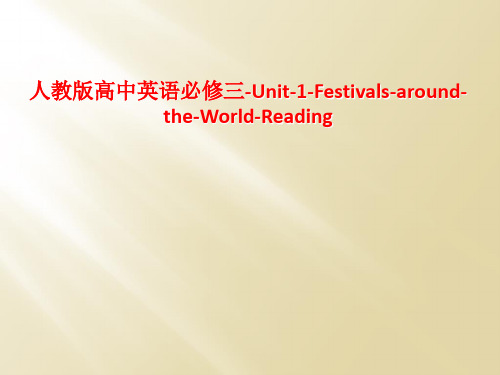
C. C. The Dragon Boat Festival is named after an old composition.
D. D. Some Western countries have carnivals
Columbus Day
festival to honour Gandhi
China USA India
Kinds Names of
of
Festivals
Festival
s
Countries
Harvest Harvest/
Festival Thanksgiving
s
festivals;
European and other countries;
carnivals.
What does the Easter celebrate? A.It celebrates the birth of Jesus. B. B. It celebrates the death of Jesus. C.C. It celebrates the return of Jesus
( )2. The festival of Halloween had its origin as an event in memory of the heroes.
( )3. October 2 is an Indian national festival to honor Mohandas Gandhi.
from the dead and the coming of spring and new life. D.D. It celebrates people’s harvest.
人教版高中英语必修3《Unit1Festivalsaroundtheworld》教案

人教版高中英语必修3《Unit1Festivalsaroundtheworld》教案人教版高中英语必修3《Unit 1 Festivals around the world》教案教学准备教学目标(1) 增进学生对中国节日的理解,了解和感悟外国的节日;(2) 提高学生的社会文化素质,加强跨国文化素质;(3) 培养学生运用资源策略。
教学重难点(1) 本单元的生词和短语;(2) 掌握一些情态动词的基本用法;(3) 了解有关节日和民俗,掌握有关词汇,如custom,religious 等。
教学工具课件教学过程Step 1. Leading-inPurpose: To activate Ss and arouse them to express their opinions about a festival.Lead Ss to the content of this unit. Teacher may say, “Do you know what is called the Christmas of China? The Spring Festival. Yes. The oldest and most important festival in China is the Spring Festival. Each country and each nation has its own festivals. Today we are going to learn something about the different festivals.”Step 2. Warming Up1. Ask Ss to turn to P1 and work in groups to complete the form on P1.2. Ask Ss to discuss festivals they have filled in the form and their importance to the society. After that, ask Ss to present theiropinions to all classmates.Step 3. Pre-listeningPurpose: To help Ss learn about the context of the Listening text.Ask Ss to talk about the following questions to get them prepared to listen to the reading text.1. How many ancient festivals do you know?2. Are foreign festivals different from Chinese festivals? In what part?Step 4. ListeningPurpose: To get the main information in the listening part.To develop Ss’ listening abilityTo learn some information about the festivals around the world.Ask Ss to listen to the tape, focus on the subjects mentioned in the passage and then answer the following question.1. How many kinds of festivals were mentioned in the text?Suggested Answer: Five.2. What are they?Suggested Answer:Ancient FestivalsFestivals of the DeadFestivals to Honor PeopleHarvest FestivalsSpring FestivalsStep 5. Pre- readingDivide Ss into groups of four and ask them to discuss the following questions.1. What’s your favorite holiday of the year? Why?2. What festivals or celebrations do you enjoy in your city ortown? Do you like spending festivals with your family or with friends? What part of a festival do you like best---the music, the things to see, the visits or the food?Step 6. Fast readingAsk Ss to read the text quickly and answer the following questions.1. What are festivals of the dead usually for?2. What make autumn festivals happy events?3. What do people usually do at spring festivals?4. What is one important reason to have festivals and celebrations?5. Compare the festivals of the dead in Mexico, Japan and China. What things are similar? What things are different?Suggested Answers:1. Festivals of the dead are for honoring or satisfying dead ancestors or others, who some people believe might return to help or harm living people.2. Autumn festivals are happy events because people are thankful that food is ready for winter and the hard farm work is finished.3. At spring festivals, people usually have dances, carnivals and other activities to celebrate the end of winter and the coming of spring.4. It is important to have festivals and celebrations so we can enjoy life / be proud of our customs / forget our work for a little while.5. The Chinese, Japanese and Mexican festivals of the dead all have customs to honour the dead. The Chinese and Japanese go to clean their ancestors’ graves, and the Mexican offer food, flowers and gifts to the dead. However, there are somedifferences. The Mexicans eat special food that looks like bones, something the Chinese and Japanese do not do.Step 7. Intensive reading1. Ask Ss to read the text carefully and sum up the main idea of each part.2. Discuss in pairs which festivals you think are the most important and which are the most fun. Then fill in the chart with your ideas.Type of festival Example of festival Reasons for your choice Most importantMost funSuggested Answer:Various answers are acceptable.3. Ask Ss the following question and encourage Ss to give some similarities that they think festivals have, and give their reasons. Then invites Ss to tell the similarities and then ask them to present them before the class.What similarities can you find among these festivals?Suggested Answer:They most include food, music or entertainment, like dances, light or fire.They are most together with family and friends.Festivals exist everywhere.Many of them celebrate similar ideas and important cultural events or remember event of people.Human beings need to have things in life to celebrate and have a break from daily struggles and demands.Step 8. HomeworkPurpose: To get a further understanding of the text.1. Ask Ss to continue discussing their opinions about festivalswith their partners.2. Ask Ss to read the text once again and try to retell the text.3. Ask Ss to discover useful words and expressions in the text.课后小结学了这节课,你有什么收获?课后习题完成课后练习题。
- 1、下载文档前请自行甄别文档内容的完整性,平台不提供额外的编辑、内容补充、找答案等附加服务。
- 2、"仅部分预览"的文档,不可在线预览部分如存在完整性等问题,可反馈申请退款(可完整预览的文档不适用该条件!)。
- 3、如文档侵犯您的权益,请联系客服反馈,我们会尽快为您处理(人工客服工作时间:9:00-18:30)。
• • • • • • •
作业本P6,II,4 --I don't care what people think. --Well, you_______. 作业本P6,II,8 --When can I have the mobile? --Well, it _____ be ready by 8:00. 作业本P6,II,9--Is John coming by train? --He _____, but he ____not. He likes driving his car. 优化P10,二,2 It has been argued by some that gifted children _____ be grouped in special classes. • 优化P10,二,5 I _____ have told him the truth, but I didn't. • 优化P13,7) What do you mean, there are only ten tickets? There _____be twelve.
表示猜测的情态动词
• 作业本P7,III
• 1) You______ tired after 10 hours' flight.
• 4) Ruth is still in her office. He _____ terribly busy today.
• 6) He looks like the doctor, but I am not sure. He ______ the doctor.
• It was not until fish _____ that the villagers realized the importance of protecting the river. • • • • --My flight _____. I'd better be on my way. Goodbye. --Bye. Happy landing. A. was announced B. is being announced C. has announced D. is announced
• 卷Unit4&5 --Would she mind playing against her former teammates?
• -- ______ D She is willing to play against any tough players.
• A. I think so B. I'm not surprised C. Of course D. Not likely
Unit1 练习exercise
How to respond to these questionbs?
• 优P13,15) Must I finish the job this afternoon? Yes, you must./ No, you needn't. No you don't have to. • 优P13,17) Need I go there with you? Yes, you must./ No, you needn't. No you don't have to. • 优P13,18) May I enter the office? Yes, please./ No, you mustn't.
• 作业本P16,II,6. I am busy now. _____ my sister instead of me go with you? • 优化P12,3) --Will you read me a story, Mummy? • -- Ok. You____have one if you go to bed as soon as possible.
• 作业本P6,II,7 If you ____ (shall/will)wait for another for another half an hour, you will see him. • 优化P13--Why didn't you come to Simon's party last night? • --I wanted to, but my mom simply _____ not let me out so late a• •
作业本P6,II,10. There will be a test tomorrow. I _____ finish the book today. 优化P13,13) Mum said to her baby, "You ____ not eat with your fingers. 课时P2,二,2 --Shall I inform him of the change of the schedule right now? --I am afraid you_____, in case he comes late for the meeting. 优化)P3,二,9. The teacher _____have thought Johnson was worth it or she wouldn't have wasted time on him, I suppose. 优化)P3,三,2. 改错:You must have studied English for many years, didn't you? He must read English every day, _____________? He must be tired, ____________? He must be working at the office, ____________? He must have come yesterday, ___________?
